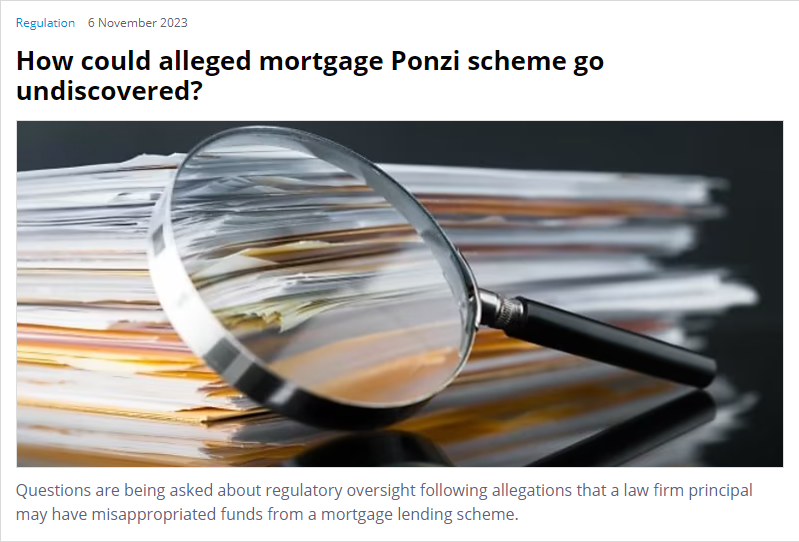Excerpt from MortgageBusiness.com.au.
Questions are being asked about regulatory oversight following allegations that a law firm principal may have misappropriated funds from a mortgage lending scheme.
Concerns have been raised about the regulatory oversight of managed investment funds after the Victorian Legal Services Board and Commissioner (VLSB+C) confirmed it was conducting a preliminary assessment into allegations that the principal of AMS Ivanhoe Lawyers, John Adams, may have misappropriated investment funds from first mortgage loans.
It has been alleged that Mr Adams had raised investor capital to put into mortgages which, when later repaid, were not discharged from the asset register. This then resulted in the appearance of a higher volume of property security values in relation to investor capital.
The independent statutory authorities responsible for the regulation of the legal profession in Victoria said that it is now liaising with the law practice, Victoria Police and relevant third parties to understand the veracity of the claims.
The issue was brought to light following the death of Mr Adams at the age of 81 last month, when his business partner Shane Maguire “identified a number of concerns in relation to mortgage investments he had arranged”, according to an ABC investigation.
The ABC has suggested that investors who had been part of the managed investment scheme believed it to be a genuine scheme, but following Mr Adam’s death, had discovered that they did not have a mortgage over a property (or mortgages had been discharged) and were “not quite sure where their money’s gone.”
The ABC has alleged that the mortgage fund – which had been running for more than 40 years – may have been a Ponzi scheme, estimating that losses may run over $100 million.
The Victorian Bookmakers Association (VBA) has confirmed that its losses may total more than $1.8 million. Other bookmakers and investors from the racing industry are believed to have had money invested in the scheme, too.
The VLSB+C investigative and regulatory/enforcement action powers relate principally to trust monies within the meaning of the Uniform Law.
‘How could this happen?’ asks Semper Secured CEO
Speaking of the case, the chief executive of private lender Semper Secured, Andrew Way, said that the allegations – if proven to be true – would be “another sad indictment of failed regulatory oversight” and would “likely be Australia’s largest Ponzi fraud”.
He said that he believed there should be better supervision of managed investment schemes operated by those outside of the finance space.
“For licensed investment managers under an Australian Financial Services Licence, or those that operate as a corporate authorised representative of an AFS licensee, the process of regulatory conformity is complex and arduous. But as far as I am concerned, these oversights are not only necessary as key disciplines for managing the Semper business, but they are also vital for ensuring investors’ interests,” Mr Way commented.
“How is it then, that a lawyer could run a Ponzi-like mortgage scheme over an alleged 40-year period?
“My questions right now are: if this Law Partner operated an unlicensed investment scheme of $100s millions for 40 years, why was it not discovered? What can be done to root these out if they exist elsewhere? And, if it was a licensed scheme, what changes are required (like RG 69) to give ASIC the information they need to act before things go wrong?”
The Semper CEO said he believed that there had not been a single debenture-funded mortgage scheme since the advent of RG 69 that had failed as a result of poor reporting standards.
He continued: “In my opinion, there must be managed investment schemes operating in Australia today heavily at risk to slowing developments and whose cash flows are so tight they can only meet future obligations in progress payments to developers by the inflow of new investors.
“If so, their scheme are at risk of being Ponzi-like practices at this very moment. I hope ASIC is watching closely.
“For those who operate with open and inclusive reporting to investors, and who pulled out of development funding years ago because of foreseeable risks, such as Semper, we can’t wait for these changes to come.”
He said that he hoped the case may rally the financial services regulator “to be proactive in change”, highlighting that it had been following multimillion-dollar losses by fraud in the debenture issuance sector after the global financial crisis.
“Following investigations into the operations of these companies, ASIC found grave holes in the oversight process for debenture issuers at large. But what came out of this situation proved to be good for investors: a total review and implementation of changes under Regulatory Guide 69 (RG 69) “Debentures and notes: Improving disclosure for retail investors,” Mr Way said.
“This included bank-like reporting benchmarks for bank-like lending businesses funded by anyone raising investment capital by the issuance of debt securities.”
Mr Way was one of the contributors to the industry body during the industry consultation period that led to ASIC’s consultation paper and then to the implementation of RG 69.
“I have long been an advocate of change in the non-bank lending space and continue to advocate for change,” he said.



